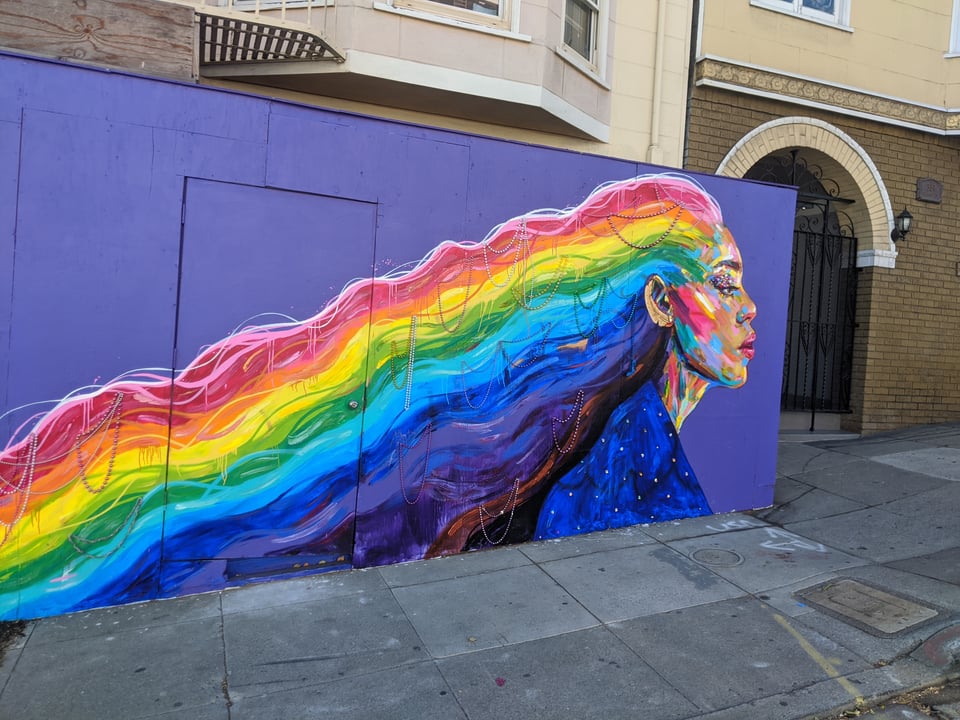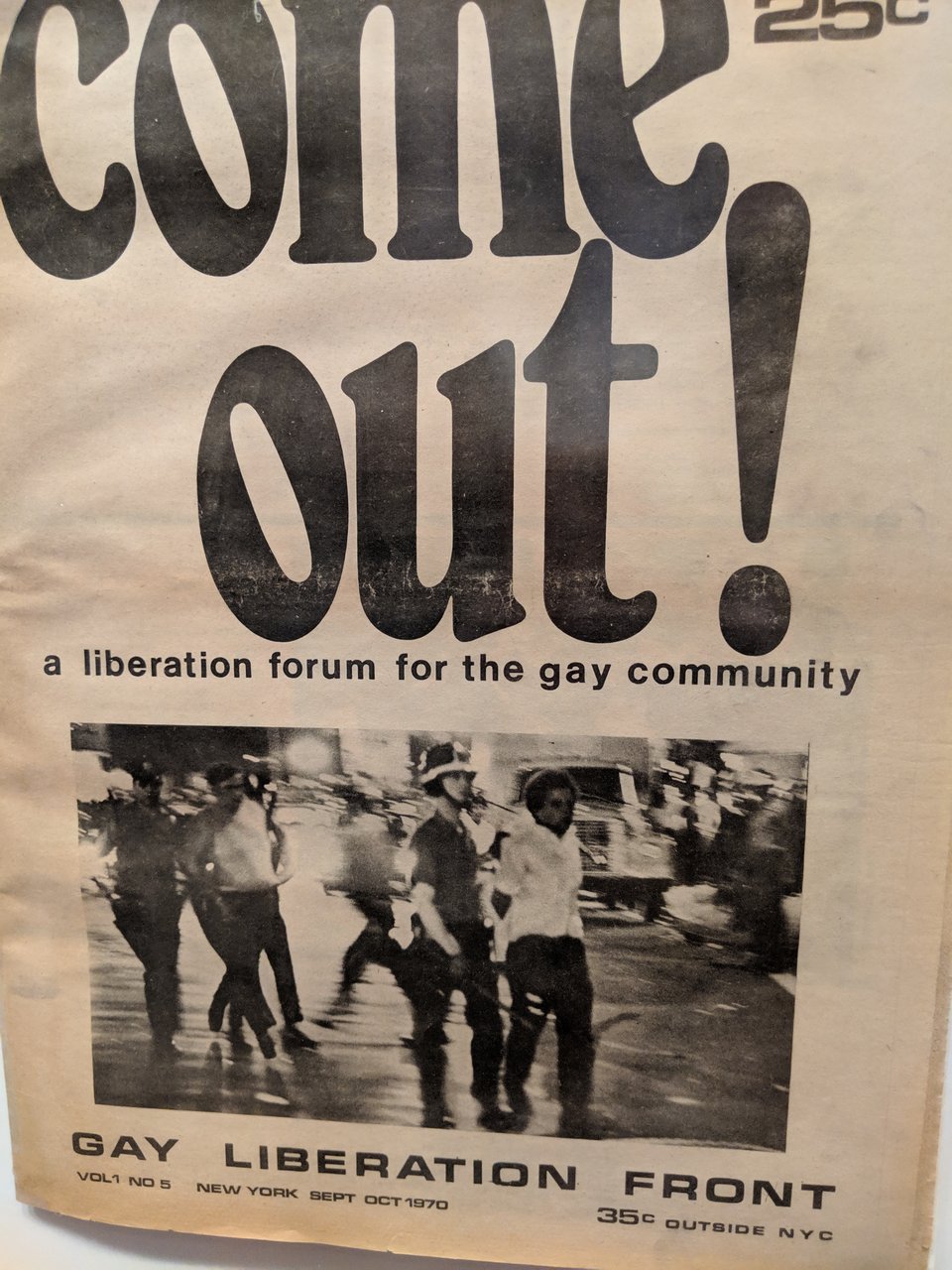They Want To Ban Books To Keep Us From Coming Out
Quick housekeeping! I’m doing a flurry of events once again:
Tuesday I’ll be in the Koret Auditorium at the SF Public Library talking about banned books for Litquake.
Thursday I’ll be at the Lost Church talking about queer magic (with Michelle Tea et al) for Litquake.
Saturday I’ll be at StoryFest in Westport, CT
Tuesday 10/21 I’ll be a visiting writer at Colorado College
And you can still get my new book Lessons in Magic and Disaster in all the places! Including Green Apple: I’ll sign, personalize, and doodle-ize your copy.
Why coming out is an act of storytelling
Today is National Coming Out Day. It's also Let Freedom Read Day, aka the final day of Banned Books Week. This feels like a lucky coincidence — or maybe it's not a coincidence, I have no idea.
When you think about it, one of the main reasons why people are so keen to ban books is to keep queer people — especially younger queers — from seeing themselves reflected in stories. When you read a book with a character who stands out from the world in the same way that you do, you begin to imagine how you could exist in the world as yourself.
In other words, one of the main purposes of book banning is to keep people from dreaming that they could ever come out.

There are many ways to try on an identity when you're still figuring out who you really are. You could play as a particular character in a video game, for example. (Or a TTRPG.) You could make an online account and post under a name and persona that reflect the person you might want to become. You can also just try out an identity in the real world for a while, to see how it fits — no harm, no foul if you change your mind.
But reading a story about someone who is gay, trans, asexual, etc., is one of the single best ways to try on an identity inside the safety of your own mind. You can identify with a character, feel what they feel, and see yourself living through their struggles and triumphs.
And coming out is, when you get right down to it, an imaginative act. You can't declare yourself until you've imagined this new version of who you are. And when you come out, you start to write the story of who you will be in this new iteration.

Part of why I like to think of coming out as an act of storytelling first and foremost is that the storyteller gets to choose how — and when — to unspool a particular narrative. And sometimes, I feel as though people have some internal pressure to come out, as if it's a duty — as if they should announce themselves sooner or louder, in the name of visibility. Or to make other people happy, especially in cases where only a few people know and it can be challenging to keep the secret.
But the same way that you might write a story to express something personal and end up touching the lives of other people who read what you wrote, coming out is for you alone. Other people getting to see you more clearly is a nice byproduct, but the point is for you to express yourself in a way that feels as comfortable as possible and makes you as happy as possible.
And yes, it's “as comfortable as possible," not completely comfortable. As with so many things in life, you sometimes have to choose between two kinds of discomfort: the closet isn't exactly comfy, but coming out can be a lot as well. Especially if you live in a place or have a family that are not accepting.
Which brings me back to why it's so important to have stories that show queer people living their lives — and not just serving as sacrificial victims for the sake of a straight character’s arc. The more stories we see that depict queer lives from the viewpoint of actual queer people, the more everyone will get used to our existence and the easier it’ll get to be our authentic selves. I really believe that. But I don't expect it to ever be completely easy for everyone, which sucks.
I really like how the TV show Heartstopper depicts Nick's process of coming out, incidentally. It takes him a long time to be comfortable with telling the world that he's bisexual, and this makes it hard for Charlie to be in a relationship with him but he has to keep secret. But people give Nick space and gentleness, and he does come out in his own time, and it's really lovely.
Anyway, we tend to think of coming out in terms of courage, which definitely is a thing. But I also like to think of coming out as one of the purest acts of creation and imagination people can ever do — and as the beginning of a long and beautiful story, not an end in itself. Happy coming out and freedom to read day, y'all.
(And here are some Coming Out Day resources shared by the Trans Life Line, for those who need some support right now.)
Bonus Rant: Knightfall will need a lot of work
Recently, I decided to rewatch The Dark Knight for no particular reason. It holds up quite well, though it’s astonishing how many plot points that movie churns through — I forgot that Jim Gordon is “dead” for like half an hour. Afterward, I started to watch The Dark Knight Rises, only to nope out of it almost immediately. The Dark Knight ends with the suggestion that Bruce Wayne will keep being Batman, but the cops will be pursuing him as a suspected murderer. The threequel then clarifies that Batman… simply retired after The Dark Knight, and the city is somehow perfectly safe because new, draconian laws were passed? Huge letdown, and I don’t love the notion that extra-harsh policing works. (Though I suppose it sets up the class struggle that leads to Bane’s Occupy Wall Street thing.)
Anyway, another reason I wasn’t keen to rewatch The Dark Knight Rises was because it rushes through adapting Knightfall, the 1993-1994 storyline where Bane crushes Batman’s spine. I’m not as sick of Knightfall as I am of The Death of Superman, but Knightfall has a lot of problems.
And yesterday at New York Comic Con, Warner Bros. announced they’ll be adapting Knightfall as a direct-to video animated duology.
I kind of miss when the DC animated films weren’t just adaptations of famous storylines from the comics — I really liked some of their original stories back in the day. But apart from that, I think Knightfall is going to need major surgery to work as a story.
Knightfall is both one of the best Batman stories and one of the worst. The genius thing about Knightfall, which I’m sure comes from Bat-editor Denny O’Neil himself, is that Bane doesn’t defeat Batman — rather, Batman’s own inability to take a break does. Batman’s great strength has always been that he does not quit. He will put himself in harm’s way, over and over, to protect the innocent, and he keeps going even when he’s in rough shape. So when Bane breaks every last inmate out of Arkham Asylum, Batman drives himself past the point of exhaustion trying to recapture them all… making him vulnerable to Bane’s attack.
Most of the rest of Knightfall is pretty bad, unfortunately. Bane lacks any of the complexity and nuance he gained later as part of Gail Simone’s run on Secret Six. Batman’s decision to select Jean-Paul Valley, a French assassin-monk who is part ape, as the new Batman instead of Dick Grayson is frankly so bafflingly irresponsible as to be out of character. Batman’s spine gets healed by Shondra Kinsolving, the ultimate Magical Negro who sacrifices her own mind to restore Bruce to full health. (And it’s bizarre for such an otherwise grounded, street-level story to have Batman healed by ill-defined mystical powers.)
The other thing I do love about Knightfall is how Batman takes down his replacement, that French ape-monk guy. Batman tricks Jean-Paul Valley into wearing night-vision lenses, then leads him out of the Batcave into the sunshine, forcing him to take off the helmet. It’s a gorgeously poetic moment that I really adore.
But all in all, I think Knightfall has more bad parts than good, and I think it’s probably a mistake overall to adapt it. Much as I don’t love The Dark Knight Rises, at least Christopher Nolan and company did the smart thing: borrow elements of this story without adapting the whole thing, massive warts and all.
